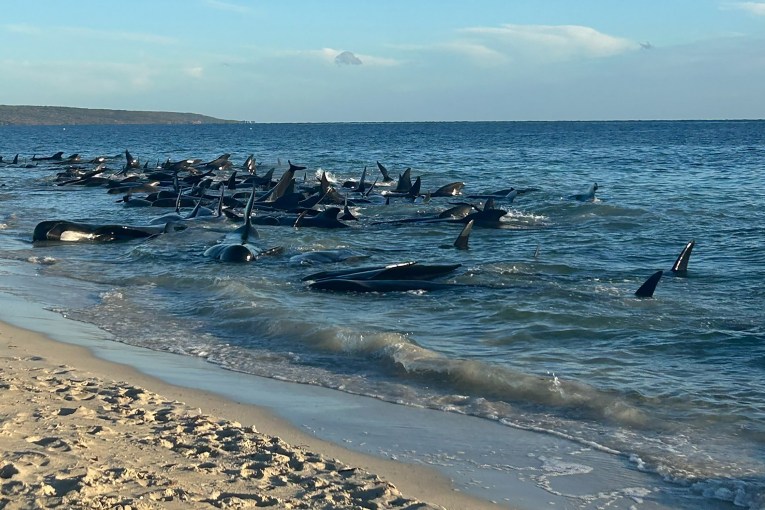‘Only option available’: WA powerless to stop the release of serial teen sex offender

Director of Public Prosecutions Amanda Forrester said the youth's "unconditional release" was mandated by law. Photo: ABC
A teenage boy accused of committing multiple sex assaults from the age of 13, including molesting a six-year-old girl while on bail, has been released into his community on the advice of psychologists.
The case comes amid renewed calls for reform to the way mentally impaired offenders, particularly juveniles, are treated in Western Australia’s justice system.
The 17-year-old, who cannot be identified for legal reasons, was facing more than 20 offences for sexual assault and burglary, and the possibility of life in detention, when his charges were dismissed in the WA Children’s Court in August.
He was first arrested at the age of 13, accused of indecently assaulting a 26-year-old woman in her home and raping a 34-year-old woman in the front yard of her house in a remote Kimberley town.
While on bail in March last year, he’s alleged to have molested a six-year-old girl, before being remanded in custody.
Under the Criminal Law (Mentally Impaired Defendants) Act 1996, if a person is found unfit to plead and has no prospect of regaining their fitness within six months, the court must dismiss the charges.
The alleged offender must then be either detained, potentially indefinitely, or released into the community.
In response to questions from the ABC, Western Australia’s Director of Public Prosecutions Amanda Forrester said the teenager was placed into the latter category by the court on August 21 and immediately released.
“Having regard to all of the factors personal to the accused, including his response to treatment since the alleged offending, a custody order was not considered appropriate,” a statement from her office said.
“The only option available to the court was to release the accused unconditionally.”
It is unclear what support services have been offered to him and other juveniles accused of offences in similar circumstances.
A spokeswoman for WA’s Department of Justice said it had no responsibility to monitor offenders after their release.
“Youth Justice has no mandate to work with the young person as per the Young Offenders Act 1994 once their legal matters are finalised by the ruling of the Magistrates/President under that Act,” she said.
Cases complicated further
Western Australia’s justice system has struggled to effectively deal with people whose violent offences were complicated by mental illness issues.

Marlon Noble: His case set a precedent whose impact is still being felt. Photo: ABC
In 2016, a United Nations Committee found Australia had breached the Convention on the Rights of Persons with Disabilities for indefinitely imprisoning Marlon Noble, an Aboriginal man charged with sexual assault.
Mr Noble was jailed for more than a decade after a West Australian court found him unfit to stand trial due to his intellectual disability.
The cases are also complicated further when the accused is a juvenile.
Three months after the UN’s finding, the Law Society of Western Australia implored the State Government to adopt a more nuanced approach to handing out appropriate sentences to people unfit for trial.
It asked the Government to put mechanisms in place to ensure defendants were not pleading guilty to avoid the consequences of being declared unfit.
Also, that there should be limits on the length of time people could be held in custody after being declared unfit to stand trial.
A review tabled to Parliament in 2016 included recommendations for greater flexibility when dealing with juveniles and removing mandatory custody orders.
The Mentally Impaired Accused Review Board has been set up to monitor those imprisoned under the Act.
It provides annual reports to the Attorney-General on the condition of the accused, which may then form the basis for a release.
In its 2016/17 annual report, the Board Chairperson, Judge Robert Cock, acknowledged the ongoing efforts to update the Act but noted “distressing reports” of accused in prisons and the widespread “adverse commentary” it received.
Despite some work having commenced on drafting a Bill, no changes to the law have emanated,” he wrote.
WA lags behind
Children’s Commissioner Megan Mitchell said that while Australia had good safeguards in this area, she believed WA had room for improvement.

Children’s Commissioner Megan Mitchell says WA can do better. Photo: ABC
“I think in general we do pretty well,” she said.
“It appears that there may be a case for reviewing the provisions of the [Mentally Impaired Defendants] Act, particularly in relation to sentencing and support for mentally ill teens who commit offences.
“I think there is a case for looking at [juvenile sentencing laws] so that we can have a more nuanced response to children and their needs.
“Indefinite detention is not something that is going to be beneficial for children and it doesn’t recognise their developmental trajectory or their developmental needs.”
In a statement, WA’s Attorney-General John Quigley said efforts were underway to design and draft reforms to the Act.
“The new Act will include youth-specific considerations which must be taken into account, including when considering the appropriate disposition option for a youth with mental impairment.
“Given the longstanding and widely recognised deficiencies with [the Act] it is critical to ensure the reforms are appropriately designed, drafted and implemented.
“Reform is long overdue and it is the Government’s aim to bring the Act into line with more progressive states as soon as possible.”
-ABC








